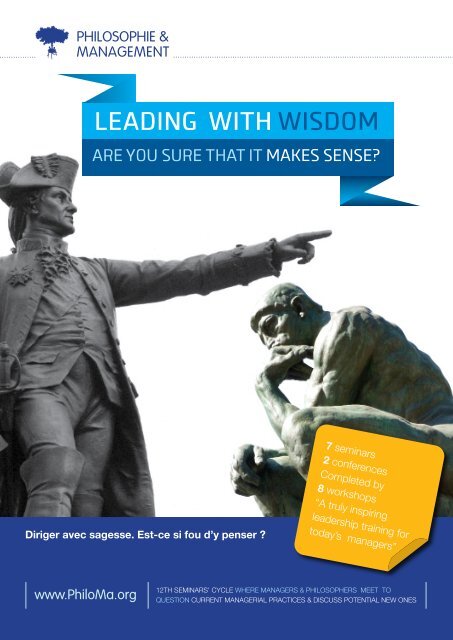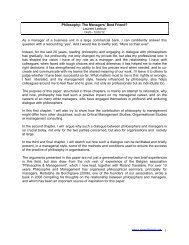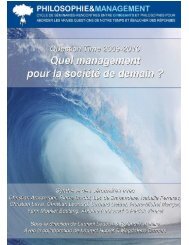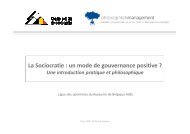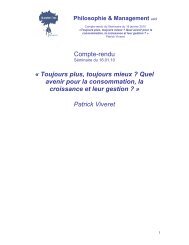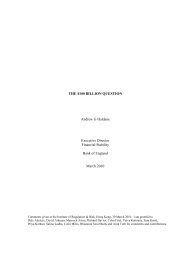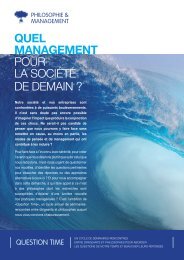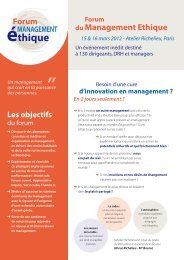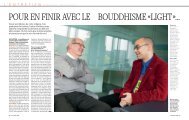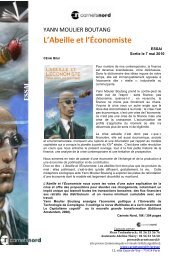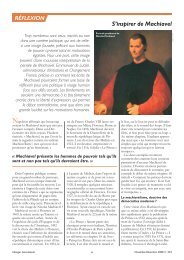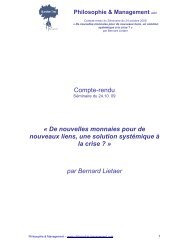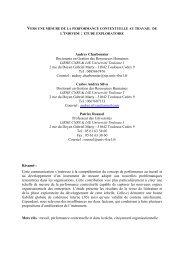Leading with wisdom - Philosophie Management
Leading with wisdom - Philosophie Management
Leading with wisdom - Philosophie Management
You also want an ePaper? Increase the reach of your titles
YUMPU automatically turns print PDFs into web optimized ePapers that Google loves.
PHILOSOPHIE &<br />
MANAGEMENT<br />
<strong>Leading</strong> <strong>with</strong> <strong>wisdom</strong><br />
Are you sure that it makes sense?<br />
Diriger avec sagesse. Est-ce si fou d’y penser ?<br />
7 seminars<br />
2 conferences<br />
Completed by<br />
8 workshops<br />
“A truly inspiring<br />
leadership training for<br />
today’s managers”<br />
www.PhiloMa.org<br />
12th seminars’ cycle where managers & philosophers meet to<br />
question current managerial practices & discuss potential new ones
PHILOSOPHIE &<br />
MANAGEMENT<br />
<strong>Leading</strong> <strong>with</strong> <strong>wisdom</strong><br />
Are you sure that it makes sense?<br />
“Wisdom is knowing that all is one”<br />
Richard Trowbridge<br />
“Leadership belongs <strong>with</strong>in the larger question of <strong>wisdom</strong>”<br />
Mark Strom<br />
“I have three precious things which I hold fast and prize.<br />
The first is gentleness; the second frugality; the third is humility, which keeps me from<br />
putting myself before others. Be gentle and you can be bold; be frugal and you can be<br />
liberal; avoid putting yourself before others and you can become a leader among men.”<br />
Lao-Tzu (Tao Te Ching)<br />
“My capacity as a leader comes from my choice to allow life to unfold through me.”<br />
Peter Senge<br />
This program is organized by the not-for-profit association Philo & <strong>Management</strong>, in partnership<br />
<strong>with</strong> (click on their logo to access their respective websites):<br />
Page 1
PHILOSOPHIE &<br />
MANAGEMENT<br />
Un cycle de séminaires-rencontres<br />
entre dirigeants et philosophes pour aborder<br />
les questions de notre temps et ébaucher leurs réponses<br />
<strong>Leading</strong> <strong>with</strong> <strong>wisdom</strong><br />
Are you sure that it makes sense?<br />
In these turbulent and uncertain times, the imperative transformation of our society, businesses and<br />
institutions calls for deepening our understanding and practice of leadership.<br />
Some people talk about “Wise Leadership”: What does<br />
that mean? Does that make sense? What does it take?<br />
Can it be learned? Am I concerned?<br />
These are just some of the questions we will address in our new annual cycle of conferences and<br />
seminars to be held in Brussels between October 2012 and June 2013.<br />
While last year’s cycle on the Intelligence of Nature had been built on published books in English<br />
and French by J. Baird Callicott, this year’s cycle is built on works to be published in 2013:<br />
- Mark Strom’s “Wise: <strong>Leading</strong> for better futures”, and<br />
- Mike Thompson’s worldwide survey on leadership and <strong>wisdom</strong>.<br />
Mark will be our speaker for our opening conference on October 11th 2012, while Mike will be the one<br />
for our closing conference on June 13th 2013.<br />
In between, each month we will investigate key dimensions, attributes, or virtues of “wise leadership”<br />
(care, courage, discernment, authority…) and various paths that may lead toward it. In each seminar<br />
we will explore to what extent wise leadership is an aspiration, a necessity, and an art:<br />
Aspiration: Is this virtue an impossible ideal or a quality that can be cultivated? What is the relationship<br />
between this virtue and <strong>wisdom</strong>? How does this virtue manifest itself in acts? What are the signs that<br />
somebody possesses this virtue?<br />
Necessity: Is this virtue necessary for leaders and managers today? How might it help to bring muchneeded<br />
change in management today?<br />
Art: How can we develop this virtue in ourselves and around us? What are the practices or exercises<br />
that can help us to do so? How can this virtue be distorted into a vice? To what should we attend<br />
when pursuing it?<br />
Page 2
PHILOSOPHIE &<br />
MANAGEMENT<br />
Un cycle de séminaires-rencontres<br />
entre dirigeants et philosophes pour aborder<br />
les questions de notre temps et ébaucher leurs réponses<br />
<strong>Leading</strong> <strong>with</strong> <strong>wisdom</strong><br />
Are you sure that it makes sense?<br />
We will be accompanied by wonderful guides and scholars on this unusual journey.<br />
While coming from diverse backgrounds and influences (European & American philosophers, Tibetan<br />
Buddhists, Aboriginal teachers, Chinese & Japanese Zen monks, English rabbis, Hindu Vedantists,<br />
Benedictine monks,…), each speaker shares this quality: they walk their talk.<br />
We believe that <strong>wisdom</strong> for leadership does not derive through intellectual reflection alone. Accordingly,<br />
for the day following each seminar, our partner EquisWorld will organize a practical workshop <strong>with</strong> our<br />
speaker to explore more deeply and practically the concepts and ideas he or she will have shared <strong>with</strong><br />
us the day before.<br />
Before detailing our program below, you might wonder:<br />
(1) Why our program is now written in a mix of French & English while, except for the opening<br />
and closing conferences, our seminars are held in French?<br />
(2) Why do we send our programs and newsletters even to those who live too far away from<br />
Brussels to be likely to attend?<br />
Our response is the same to both questions: Philo & <strong>Management</strong> is a not-for-profit organization and<br />
its objective is to stimulate reflection on management among managers and non-managers alike. We<br />
do this through regular in-depth dialogues <strong>with</strong> philosophers and other intellectuals. We therefore want<br />
to engage not only the participants at our seminars, but also others through reading our program,<br />
monthly newsletters and seminars reports, or accessing other resources (articles, podcasts, videos) on<br />
our website.<br />
And we do engage some: our website already receives more than 100,000 hits a month from all over<br />
the world. As this new cycle shows, we are able to invite more and more international speakers, and we<br />
hope some of them will be invited to give further seminars in English (many of them are fluent in English).<br />
Thus there is growing use of English while the bulk of our activities remains in French.<br />
PhiloMa’s growing activities require resources that the seminars alone cannot generate.<br />
Practically, we need volunteers’ time to upload and tag documents on our website and<br />
we need financial support for website development and administrative support. So, if you<br />
want to give some of your time or want to make a financial donation, please click here.<br />
Page 3
PHILOSOPHIE &<br />
MANAGEMENT<br />
Program at a glance of PhiloMa’s 2012-2013<br />
cycle of conferences & seminars<br />
11/10/12<br />
Opening conference (in English):<br />
“Talking transformation: what is the <strong>wisdom</strong><br />
& impact of genuine human engagement?”<br />
Mark Strom<br />
Australian who coaches across<br />
the world Inspired among others<br />
by Ancient Greece<br />
13/11/12<br />
03/12/12<br />
Seminar 1 (in French)<br />
Obedience, intuition & frugality<br />
the way of the monks?<br />
Obéissance, intuition & sobriété – la voie des moines ?<br />
Seminar 2 (in French)<br />
Elegance, generosity & justice<br />
the way of the knights?<br />
Elegance, générosité & justice – la voie des chevaliers ?<br />
Sébastien Henry<br />
French who worked in China & Japan<br />
Inspired among others by chinese &<br />
japanese zen monks and by<br />
benedictine monks<br />
Fabrice Midal<br />
French<br />
Inspired among others<br />
by Tibetan buddhism and<br />
western and eastern chivalry codes<br />
29/01/13<br />
25/02/13<br />
25/03/13<br />
Seminar 3 (in French)<br />
Simplicity, humility & inner calm<br />
the way of techniques?<br />
Simplicité, humilité & tranquillité intérieure - la voie de la technique ?<br />
Seminar 4 (in French)<br />
Courage, naming & promise<br />
the way of democratic groups?<br />
Courage, dire vrai & imaginatio vera la voie de la démocratie ?<br />
Seminar 5 (in French):<br />
Care, sensitivity & responsability<br />
the way of women?<br />
Soin des autres, sensibilité & responsabilité la voie des femmes ?<br />
Jacques Castermane<br />
Belgian<br />
Inspired by Japanese Zazen<br />
as brought back to Europe<br />
by Karlfried Graf Dückheim<br />
Cynthia Fleury<br />
French who teaches at<br />
Paris American University<br />
Inspired by various<br />
European & American philosophers<br />
Pascale Molinier<br />
French<br />
Inspired among others by the ethics<br />
of care developed by american<br />
psychologist Carol Gilligan<br />
23/04/13<br />
Seminar 6 (in French):<br />
Dialogue, influence & authority<br />
the way of three great sages?<br />
Dialogue, influence & autorité la voie des trois grands sages ?<br />
Emmanuel Toniutti<br />
Swiss who studied in Canada<br />
Inspired among others<br />
by Confucius, Socrates & Jesus<br />
23/05/13<br />
Seminar 7 (in French):<br />
OBJECTIVITY, DISCERNMENT & INSIGHT<br />
THE WAY OF VEDANTA?<br />
Objectivité, discernement et sagacité La voie du Védanta ?<br />
Surya Tahora<br />
Indian who studied in France<br />
Inspired by Hindu Vedanta<br />
13/06/13<br />
Closing conference (in English):<br />
Wisdom: ethical foundation<br />
for managerial decision-making?<br />
Mike Thompson<br />
British who teaches in China<br />
Carried out a worldwide survey among<br />
business leaders on wise leadership<br />
All conferences and seminars will take place at ICHEC, at the Manoir d’Anjou campus<br />
(Rue au Bois 365A, B-1150 Brussels; Access plan ; Tel: +32 2 739 38 60).<br />
They will start 19:30 (reception starting at 19:00) and end between 22:00 and 22:30.<br />
A light diner will be served between the speaker’s presentation and our debates in sub-groups and plenary.<br />
Registrations & prices: see at the end of the brochure.<br />
Independent but complementary workshops<br />
will be organized by EquisWorld & Partners on the day(s) following each seminar (half a day, a full day or more).<br />
See the program at a glance on next page.<br />
For more info on conferences, seminars or workshops, do not hesitate to contact or call<br />
Laurent at: ledoux.laurent@gmail.com - +32 478 62 14 20.<br />
Page 4
This program is organized by the not-for-profit association<br />
Program at a glance<br />
Complementary workshops<br />
organized independently<br />
by EquisWorld & Partners<br />
“Wisdom can’t replace philosophy; philosophy can’t replace <strong>wisdom</strong>. We need both. We also need the difference between both.”<br />
Writes André Comte-Sponville in his introduction to Jacques Castermane’s wonderful book: “La sagesse exercée”.<br />
This is the reason why EquisWorld, an initiative by Laurent Ledoux, set up a cycle of workshops which complements PhiloMa’s<br />
new cycle of seminars on leadership & <strong>wisdom</strong>. While PhiloMa wants to keep its activities to seminars, this year’s theme would not<br />
have been complete <strong>with</strong>out an intiation to a wide range of techniques and exercises which invite us to be completely, physically,<br />
involved, not just intellectually.<br />
09/11&<br />
10/11/12<br />
19:00-18:00<br />
Workshop 1<br />
14/11/12<br />
09:00-12:30<br />
Workshop 2<br />
04/12/12<br />
09:00-12:30<br />
Workshop 3<br />
(in ENGLISH)<br />
leading <strong>with</strong> trust and <strong>wisdom</strong><br />
Diriger en confiance et avec sagesse<br />
Mark Strom<br />
(in French or English in function of participants)<br />
Meditating & listening to your deep intuition:<br />
Meaning & serenity in the midst of action<br />
Méditation & écoute de son intuition profonde : sens et sérénité au coeur de l’action<br />
Sébastien Henry<br />
(in French)<br />
Meditation as an art of living<br />
La méditation comme art de vivre<br />
Fabrice Midal<br />
30/01/13<br />
09:00-12:30<br />
Workshop 4<br />
(in French)<br />
Practical <strong>wisdom</strong> exercises: an introduction<br />
La sagesse exercée : une introduction<br />
Jacques Castermane<br />
08/02 &<br />
15/03/13<br />
09:00-17:00<br />
Workshop 5<br />
(In French or English in function of the participants)<br />
Presence & Leadership:<br />
paradigm change & exercices for an embodied leadership<br />
Présence & Leadership : Changement de paradigme & pratiques pour un leadership incarné<br />
Pierre Goirand<br />
30/03/13<br />
09:00- 17:00<br />
Workshop 6<br />
(in French)<br />
Practical introduction to spiritual exercices: philosophy as a way of living<br />
Introduction aux exercices spirituels : la philosophie comme manière de vivre<br />
Xavier Pavie<br />
24/04/13<br />
09:00-18:30<br />
Workshop 7<br />
24/05 -<br />
26/05/13<br />
09:00-18:00<br />
Workshop 8<br />
(In French or English in function of the participants)<br />
The leader’s fears<br />
Les peurs du leader<br />
Emmanuel Toniutti<br />
(in French or English in function of the participants)<br />
Leadership by objectivity<br />
Leadership et objectivité<br />
Surya Tahora<br />
All workshops will take place at ICHEC, at the Manoir d’Anjou campus (Rue au Bois 365A, B-1150 Brussels;<br />
Access plan ; Tel: +32 2 739 38 60).<br />
Prices & registrations vary from workshop to workshop and can be found in the workshop brochure here.<br />
Workshops’ details can also be found on the agenda page of www.philoma.org.<br />
For more info, do not hesitate to contact or call Laurent at: ledoux.laurent@gmail.com - +32 478 62 14 20.<br />
in partnership <strong>with</strong>:<br />
Page 5
Detailed program of PhiloMa’s 2012 – 2013 cycle<br />
PHILOSOPHIE &<br />
MANAGEMENT<br />
Un cycle de séminaires-rencontres<br />
entre dirigeants et philosophes pour aborder<br />
les questions de notre temps et ébaucher leurs réponses<br />
11/10/2012<br />
19:30-22:00<br />
ICHEC<br />
Manoir d’Anjou<br />
Opening CONFERENCE<br />
(in english)<br />
Talking<br />
transformation:<br />
what is the<br />
<strong>wisdom</strong> & impact<br />
of genuine<br />
human<br />
engagement?<br />
Mark Strom studied theology,<br />
philosophy and history in Australia<br />
and the USA culminating in a PhD<br />
in the history of ideas. His research<br />
constituted a major study of the roots<br />
of modern leadership complexities<br />
in the traditions that shaped western thought<br />
and society. Mark has consulted to corporations<br />
and government bodies on leadership, learning,<br />
engagement, and innovation. From 2005-10, Mark<br />
was CEO of Laidlaw College. Mark is currently<br />
working on a new book building on his former,<br />
highly inspiring work, “Arts of the Wise Leader”.<br />
You can access here a draft of the chapter on<br />
Conversation. The working title of the new book is<br />
Wise: <strong>Leading</strong> for Better Futures, to be published<br />
in early 2013. For more information on Mark, visit<br />
his Linkedin page and watch this video of a recent<br />
speech he gave.<br />
Every manager wrestles <strong>with</strong> employee engagement. It has become the holy grail<br />
of transformation and innovation. Mark has personally led such changes as a<br />
CEO, and reflected on them philosophically. His insights are refreshingly free of the<br />
pseudo-sophistication of managerial concepts, and grounded in personal leadership<br />
experience. A highly engaging and interactive thinker and speaker, Mark communicates<br />
his ideas brilliantly using story and reflection.<br />
Mark will use this session to introduce the ideas and tools he calls the Arts of the<br />
Wise Leader, the basis of our next cycle of seminars. He will particularly focus on the<br />
power of real conversations, stories, and ‘sideways’ questions to unlock the brilliance<br />
of individuals and groups who work in difficult and complex contexts.<br />
At the heart of Mark’s Arts of the Wise Leader is a simple<br />
conviction and hypothesis: leadership needs <strong>wisdom</strong>.<br />
Or more specifically: when we converse about leadership <strong>with</strong>in the larger topic of<br />
<strong>wisdom</strong>, we gain a richer view of leadership and are able to circumvent populist clichés<br />
and formulas about it. For Mark, <strong>wisdom</strong> enables a leader to read key patterns of life<br />
(naming, conversing, influencing and facing uncertainty) and to apply these insights<br />
<strong>with</strong> discernment and care (through the arts of story, brilliance, promise and grace).<br />
Mark will build the evening around the remarkable story of the transformation of a<br />
tough public school in Sydney, Australia. This transformation has continued and<br />
deepened for nearly a decade <strong>with</strong> clear metrics showing deep change. Mark was the<br />
principal adviser to the school and the architect of the approach they adopted.<br />
This opening conference will be a wonderful opportunity to start exploring Mark’s<br />
conviction and hypothesis which will be at the core of PhiloMa’s new cycle.<br />
In order to converse <strong>with</strong> Mark and all participants about the arts of the wise leader<br />
we have also invited several well-known philosophers and leadership specialists from<br />
various Belgian universities to this unique event.<br />
Page 6
Detailed program of PhiloMa’s 2012 – 2013 cycle<br />
PHILOSOPHIE &<br />
MANAGEMENT<br />
Un cycle de séminaires-rencontres<br />
entre dirigeants et philosophes pour aborder<br />
les questions de notre temps et ébaucher leurs réponses<br />
13/11/2012<br />
19:30-22:00<br />
ICHEC<br />
Manoir d’Anjou<br />
Seminar 1 (in French)<br />
Obedience,<br />
intuition &<br />
frugality<br />
-the way<br />
of the monks?<br />
Obéissance, intuition<br />
& sobriété<br />
– la voie des moines ?<br />
Sébastien Henry has spent the last<br />
ten years as the CEO of an enterprise<br />
in China and Japan where he has<br />
been particularly inspired by the life<br />
rules of Buddhist monks. He started<br />
practicing meditation daily 12 years<br />
ago. For more info, see his website, presenting his<br />
two books.<br />
Henry est l’auteur de “Quand les décideurs<br />
s’inspirent des moines. Neuf principes pour<br />
donner du sens à votre action” (Dunod, 2012) et<br />
est spécialiste de l’accompagnement de dirigeants<br />
dans leur développement spirituel au coeur de<br />
l’action.<br />
“To lead wisely is to pay attention to the very ordinary, difficult and magnificent human<br />
phenomena of how a person comes to the fore in one context, and gets behind<br />
someone else in another” writes Mark Strom. In other words, wise leaders know when<br />
to lead and when to follow.<br />
Is being ready to follow and obey the rules or a master also<br />
a condition to grow spiritually and paradoxically the door to<br />
freedom?<br />
How can one transform obedience into a personal growth factor?<br />
Who obeys most in a monk community? The abbot or the monks?<br />
Can our intuition be our ultimate master?<br />
These are some of the questions we will discuss <strong>with</strong> Sébastien Henry who spent<br />
years studying the way of life of Benedictine and Zen monks.<br />
Together <strong>with</strong> him, we will also investigate what wise leaders can learn from the vows<br />
of poverty and frugality that monks from most convictions take. Can such vows have<br />
any meaning in a business world, focused on profit (and bonuses) growth? Can they,<br />
like Pierre Rahbi’s “joyful frugality”, inspire alternative behaviors among leaders?<br />
L’obéissance n’est pas un mot qui fait rêver les décideurs. L’exemple des moines<br />
appelle toutefois à un autre regard : tout comme les apprentis s’en remettent au maître<br />
pour le développement de leur art, les moines font confiance à leur chef spirituel pour<br />
les guider avec justesse dans leur cheminement, où les pièges sont nombreux. Pour<br />
eux, l’obéissance est finalement une écoute attentive et un facteur de progrès spirituel.<br />
Ce travail d’écoute attentive, de discernement, est à la disposition<br />
de chaque décideur, croyant ou non.<br />
Si le travail avec un maître spirituel reste la voie de progrès la plus sûre, apprendre à<br />
se mettre à l’écoute de son intuition profonde et prendre le risque d’y « obéir » mène<br />
à un chemin de liberté et de puissance où grandit l’impact et le rayonnement d’un<br />
décideur. C’est aussi un défi considérable, car l’intuition profonde parle avec force<br />
et n’hésite pas à bousculer. Sur ce thème passionnant de l’intuition, les œuvres<br />
d’Homère, Marc Aurèle, Nietzsche et Lao Zi (Lao Tseu) seront aussi invitées à<br />
apporter des éclairages.<br />
Page 7
Detailed program of PhiloMa’s 2012 – 2013 cycle<br />
PHILOSOPHIE &<br />
MANAGEMENT<br />
Un cycle de séminaires-rencontres<br />
entre dirigeants et philosophes pour aborder<br />
les questions de notre temps et ébaucher leurs réponses<br />
03/11/2012<br />
19:30-22:00<br />
ICHEC<br />
Manoir d’Anjou<br />
Seminar 2 (in French)<br />
Elegance,<br />
generosity &<br />
justice – the way<br />
of the knights?<br />
Elegance,<br />
générosité & justice<br />
– la voie des chevaliers ?<br />
Fabrice Midal is a French philosopher,<br />
specialist of Buddhism. Among many<br />
others, he has written two books on<br />
today’s relevance of the medieval<br />
knight’s code of conduct. This autumn<br />
he will also publish a pocket version<br />
of his successful book, “Méditations”, on how<br />
contemplation can induce, rather than inhibits,<br />
action.<br />
Midal est l’un des principaux enseignants<br />
de méditation français, fondateur de l’Ecole<br />
Occidentale de Méditation. Son oeuvre trace<br />
par delà philosophie, méditation, art moderne et<br />
poésie, un chemin où il tente de montrer comment<br />
la méditation ouvre un nouveau rapport décisif à<br />
soi, aux autres et au monde. Son travail l’a conduit<br />
à travailler entre autres sur le sens de la chevalerie<br />
occidentale « La voie du chevalier » (Payot) comme<br />
voie de dépassement de soi, vivifiant la dignité de<br />
l’homme hors de tout dogme religieux. Son livre<br />
« Pratique de la méditation » sortira cet automne.<br />
“The wise leader’s art of brilliance is to create space for others to shine, to build and<br />
nurture elegance <strong>with</strong> a mind and heart fixed on beauty” writes Mark Strom.<br />
Should wise leaders be primarily concerned by the goodness and<br />
truthfulness of their intents and deeds?<br />
Or should they equally be concerned <strong>with</strong> the beauty and elegance<br />
of their thoughts and acts? Are these concerns somehow linked?<br />
How?<br />
What can the medieval knights’ codes of conduct tell us about it?<br />
What are the links between the knights’ concerns for elegance,<br />
generosity and justice among others?<br />
What can knights teach business leaders, and all of us, today?<br />
Can/should today’s leaders try to be modern knights?<br />
These are some of the questions we will discuss <strong>with</strong> Fabrice Midal. Fabrice has not<br />
only written extensively about chivalry, but he is also “brilliant” in many ways: colourful<br />
and full of poetry in his ideas as in his clothes, all his acts and thoughts seem directed<br />
at creating space for others to shine. According to him, the knights’ ideal requires<br />
work upon oneself, to be more just, and work “in the world”. This double work can<br />
be found both in western and eastern (Samouraïs’ code, Sun Tsu’s art of war) ideals<br />
of the knight. One finds in these diverse traditions the same pursuit of the arts of the<br />
just action, of the strategy that wins <strong>with</strong>out resorting to violence, and of surpassing<br />
oneself.<br />
La « voie du chevalier « est une voie d’accomplissement qui<br />
s’adresse à tous.<br />
Elle montre comment aller directement à l’essentiel, ne pas fuir la peur, oser sans pour<br />
autant détenir de certitude, méditer et agir sans se couper de la pensée. Fondé sur<br />
l’héroïsme, la tendresse et la justice, l’esprit de chevalerie, qui fut en partie revendiqué<br />
durant la Seconde Guerre mondiale par les Résistants, peut s’avérer dans la société<br />
actuelle d’une aide précieuse pour se connaître, s’épanouir et émanciper.<br />
Dans « La voie du chevalier », Fabrice Midal, nous aide à percevoir l’importance et la<br />
pertinence de l’idéal chevalresque aujourd’hui : « L’idéal chevalresque est apparu au<br />
XIIe siècle comme un défi lancé à un ordre social qui menaçait la liberté. Aujourd’hui<br />
encore, le même défi s’ouvre à nous. Il nous faut retrouver la possibilité d’une action<br />
juste, où chacun peut se manifester le plus pleinement possible, être lui-même, et<br />
non pas un simple élément interchangeable dans le vaste marché global. […] Le<br />
chevalier est l’homme décidé à ne plus être le nombril du monde, et à mettre le<br />
bonheur des autres à la première place, sans avoir besoin pour cela d’aucune garantie<br />
pour lui-même. Il n’a pas peur d’agir gratuitement, pour la beauté du geste. L’éthique<br />
chevalresque n’est pas prescriptive, elle ne dépend pas de règles de comportement<br />
strictes qu’il faudrait suivre ensuite à la lettre. Elle est l’aventure de la liberté, portée<br />
par un idéal de courtoisie, de politesse et d’attention aux autres. […] L’action atteint sa<br />
pleinitude dans la courtoisie – le souci d’une élégance physique, morale et spirituelle<br />
de tous les instants. »<br />
Page 8
Detailed program of PhiloMa’s 2012 – 2013 cycle<br />
PHILOSOPHIE &<br />
MANAGEMENT<br />
Un cycle de séminaires-rencontres<br />
entre dirigeants et philosophes pour aborder<br />
les questions de notre temps et ébaucher leurs réponses<br />
29/01/2013<br />
19:30-22:00<br />
ICHEC<br />
Manoir d’Anjou<br />
Seminar 3 (in French)<br />
Simplicity,<br />
humility<br />
& inner calm<br />
– the way<br />
of techniques?<br />
Simplicité, humilité<br />
& tranquillité intérieure<br />
– la voie de la technique ?<br />
Kinesitherapist, Jacques Castermane<br />
has practiced various martial arts and<br />
followed for more than 20 years the<br />
teachings of Karlfried Graf Dürckheim.<br />
He has published various books<br />
based on these teachings and his own<br />
experience as the director of the Centre Dürckheim,<br />
school of practical <strong>wisdom</strong>.<br />
Une quête de sens, que le savoir ne peut assouvir,<br />
a conduit Castermane à une longue exploration des<br />
pratiques de la tradition orientale l’aïkido, le karaté,<br />
la cérémonie du thé et le tir à l’arc. Convaincu que<br />
la vie spirituelle est affaire d’expérience, il suivra<br />
l’enseignement du vieux sage de la Forêt-Noire,<br />
Karlfried Graf Dürckheim, pendant plus de vingt<br />
ans. Depuis 1981, il anime le Centre Dürckheim,<br />
école de sagesse exercée. Il a publié plusieurs<br />
livres : « Le Centre de l’être » (entretiens avec<br />
Dürckheim), « La Sagesse exercée » et « Comment<br />
peut-on être zen ? ».<br />
“Part of <strong>wisdom</strong> is reading foolishness. Problems often arise when theory loses touch<br />
<strong>with</strong> the world. […] To lead wisely today may mean unmasking foolish managerialism,<br />
characterized by blind reliance on abstract thought and wooden schemes and systems<br />
that mislead and complicate, that reduce what is living and changing to fixed and clumsy<br />
categories. […]<br />
Humilty can help unmask managerialism. Humility <strong>with</strong> nobility opens up a bigger life. A<br />
willingness to learn from all, to do little things well. […] To be humble is to recognise that we<br />
are both small and big. Small in the face of a big world offering a large life. Big in the face<br />
of the petty fears and self-doubt that may rob us of the joy of life. Small as those who have<br />
much to learn. Big as those who can learn far more than we can imagine. […]<br />
The argument for humility will mean little to those whose focus is on the short term and their<br />
own advancement. If the daily movement of the share price is our guide to significance,<br />
then we shouldn’t bother <strong>with</strong> humility. Arrogance, bravado and a certain callousness in<br />
the use of people will get the results – for as long as they last. Building what lasts requires<br />
faith, persistence, resolve, grace. Humility opens us to a world big enough to warrant<br />
perseverance; big enough to learn from.” writes Mark Strom.<br />
Why do so many quality systems lead to poorer quality products<br />
and services?<br />
Why is craftsmanship so undervalued today?<br />
Can leaders learn to read the patterns of “foolish managerialism”<br />
and discern how to unmask it?<br />
Can the daily practices of exercises of Zen help?<br />
Can such practical exercises (such as serving tea) really help us<br />
grow in <strong>wisdom</strong> and find inner peace? What does it require?<br />
What can organizational leaders learn from it?<br />
These are some of the questions we will discuss <strong>with</strong> Jacques Castermane who has been<br />
practicing such Zen exercises for decades, following the “way of techniques” or “of the<br />
action” developed by his master, Karlfried Graf Dürckheim<br />
« Apprendre à mieux vivre, ce n’est pas se lancer dans de grandes spéculations<br />
métaphysiques, c’est se glisser dans le sentir… » écrit Jacques Castermane. En effet,<br />
comme le remarque André Comte-Sponville, « la sagesse ne tient pas lieu de philosophie ;<br />
la philosophie ne tient pas lieu de sagesse. Nous avons besoin des deux, et de la différence<br />
entre les deux ». C’est pourquoi, Karlfried Graf Dürckheim a proposé en Occident, après<br />
un long séjour au Japon auprès de maîtres Zen, un autre chemin vers la sagesse : non plus<br />
celui du discours philosophique, mais celui de l’exercice spirituel : « la voie de la technique<br />
» ou « de l’action », banale en Orient, singulière en Occident.<br />
Par des exercices pratiques et quotidiens (que ce soit par exemple servir le thé ou tirer<br />
à l’arc), cette voie permet à l’homme de se mettre en accord, en résonance, avec « une<br />
action qui est déjà en action au plus profond de soi-même » : l’être ! Ainsi, si l’homme<br />
fait un exercice à fond, tous les secteurs de sa vie intérieure sont fécondés par cette<br />
profondeur ; le silence et la pratique quotidienne érode son ego et le transforme. Et cela<br />
permet à l’homme de retrouver tranquillité du corps, sérénité de l’esprit et paix de l’âme qui<br />
caractérise son état naturel et que le monde compliqué et bruyant dans lequel il vit lui fait<br />
trop souvent oublier.<br />
Ce séminaire sera l’occasion de dialoguer avec Jacques Castermane sur les principes de<br />
la voie proposée par Dürckheim, un chemin de maturation qui préfère l’action à la réflexion,<br />
l’expérience au discours : une voie dont la méthode est la pratique d’exercices qui font<br />
passer celui qui s’exerce d’un niveau d’action à un autre niveau d’action, permettant le<br />
passage d’un niveau d’être à un autre niveau d’être intérieur.<br />
Page 9
Detailed program of PhiloMa’s 2012 – 2013 cycle<br />
PHILOSOPHIE &<br />
MANAGEMENT<br />
Un cycle de séminaires-rencontres<br />
entre dirigeants et philosophes pour aborder<br />
les questions de notre temps et ébaucher leurs réponses<br />
25/02/2013<br />
19:30-22:00<br />
ICHEC<br />
Manoir d’Anjou<br />
Seminar 4 (in French)<br />
Courage, naming<br />
& promise<br />
– the way<br />
of democracy?<br />
Courage, dire vrai<br />
& imaginatio vera<br />
– la voie de la démocratie ?<br />
“To lead wisely is to enable others to name themselves truly and strongly […], to name<br />
and renew the key missing conversations […], to have the courage to speak into<br />
darkness […] and to challenge weak interpretations <strong>with</strong> promise: the art of building<br />
and nurturing strength of character <strong>with</strong> a mind and heart fixed on goodness,” writes<br />
Mark Strom.<br />
As leaders of organizations, do we realize how much rests on our<br />
words?<br />
What is the impact of how we speak, how we name, and how we<br />
allow others to speak and to name?<br />
Do we realize how much we create reality through language (for<br />
example, if one says life is hard, it will be hard)?<br />
Can we act purposefully <strong>with</strong>out naming purposefully?<br />
Is the primary job of a leader to name and keep alive the core<br />
conversation that is at the heart of every group of people who work<br />
together?<br />
What courage does it take to promise, to speak <strong>with</strong> intention and<br />
hope, even when facing the void?<br />
These are some of the questions we will discuss <strong>with</strong> Cynthia Fleury, whose book<br />
“La fin du courage” dares to name an important but missing conversation in our<br />
democracies.<br />
Cynthia Fleury is a French philosopher,<br />
professor at the American University<br />
of Paris, Sciences Po and l’Ecole<br />
Polytechnique. She has published<br />
among other works an insightful book<br />
on courage: “La fin du courage: la<br />
reconquète d’une vertu démocratique”.<br />
Bien que Cynthia Fleury et Mark Strom ne se connaissent pas et ne se sont pas lus l’un<br />
et l’autre, leurs mots, souvent pleins de poésie, se font écho.<br />
Ainsi, dans le sillage de Giorgio Agamben, Cynthia Fleury écrit que « le courageux<br />
perçoit l’obscurité de son temps comme une affaire qui le regarde. […] Il<br />
est capable non seulement de fixer le regard sur l’obscurité de l’époque, mais aussi de<br />
percevoir dans cette obscurité une lumière qui dirigée, vers nous s’éloigne infiniment ».<br />
Fleury réfléchit principalement sur les outils de<br />
régulation démocratique, comme elle l’évoque<br />
dans cette vidéo. Partant d’un constat personnel<br />
d’épuisement moral, « La fin du courage » est un<br />
plaidoyer pour la reconquête du courage sur le<br />
plan éthique et politique. Membre fondatrice du<br />
Réseau international des femmes philosophes,<br />
parrainé par l’Unesco, elle est également viceprésidente<br />
d’EuropaNova, ainsi que présidente<br />
de son comité d’orientation.<br />
Dans le sillage de Foucault, elle souligne l’importance de la langue du courage qui est<br />
celle de la parrêsia, c’est-à-dire le dire vrai, la parole libre et droite, prête à la délibération.<br />
Dans le sillage de Bergson, elle pense que le courageux « garde par-devers lui le sens et<br />
la volonté de la joie », tout en restant le plus clairvoyant des hommes.<br />
Et enfin, dans le sillage de Corbin, elle rappelle que le dire vrai s’inscrit dans le règne<br />
de l’imaginatio vera, l’imagination vraie, dont la gageure est d’inventer le réel sans le<br />
fuir, de l’orienter, de lui conférer un sens.<br />
Spécialiste des outils de régulation démocratique, nous aborderons aussi avec<br />
Cynthia Fleury la question de l’articulation entre le courage individuel et le courage<br />
collectif : si l’homme courageux est toujours solitaire, l’éthique collective du courage<br />
est seule durable.<br />
Comment dès lors reformuler aujourd’hui une théorie du courage ? Comment convertir<br />
le découragement actuel de tant de personnes en reconquête de l’avenir ?<br />
Comment, au sein des organisations, retrouver ce courage (et le mettre en pratique)<br />
afin de refaire de l’entreprise un lieu de construction sociale ?<br />
Page 10
Detailed program of PhiloMa’s 2012 – 2013 cycle<br />
PHILOSOPHIE &<br />
MANAGEMENT<br />
Un cycle de séminaires-rencontres<br />
entre dirigeants et philosophes pour aborder<br />
les questions de notre temps et ébaucher leurs réponses<br />
25/03/2013<br />
19:30-22:00<br />
ICHEC<br />
Manoir d’Anjou<br />
Seminar 5 (in French)<br />
Care, sensitivity<br />
& responsability<br />
– the way<br />
of women?<br />
Soin des autres, sensibilité<br />
& responsabilité<br />
– la voie des femmes ?<br />
Master of Conference in psychology<br />
and researcher in psychodynamics<br />
(also known as dynamic psychology<br />
at work), Pascale Molinier is one<br />
of the leading intellectuals who have<br />
contributed to import and develop the<br />
ethics of care in France.<br />
Molinier est professeure de psychologie à<br />
Paris 13 Villetaneuse et directrice adjointe de<br />
l’UTRPP (Unité transversale de recherches<br />
en psychogénèse et psychopathologie). Ses<br />
travaux de recherches se situent dans le champ<br />
de la psychodynamique du travail, en particulier<br />
pour les métiers du soin. Outre plusieurs livres<br />
sur les enjeux psychiques au travail, elle a<br />
publié « Qu’est-ce que le care ? », fruit d’un<br />
travail pluridisciplinaire avec Sandra Laugier<br />
(philosophe) et Patricia Paperman (sociologue).<br />
“To lead wisely is to lead <strong>with</strong> grace. Grace is treating people <strong>with</strong> care, kindness,<br />
generosity and dignity, regardless of their rank or position or our own. Grace subverts<br />
rank <strong>with</strong> kindness. It overthrows mindless bureaucracy and sophisticated pettiness<br />
<strong>with</strong> small acts of gentle dignity. To show grace is to refuse to judge a person as a<br />
human being by any mark of rank and status. In every hard decision there is still a<br />
way to treat even the undeserving <strong>with</strong> dignity. […] Grace is also the antithesis of<br />
control: you will know you are leading by grace when you let go of controlling other,<br />
when you do not need to control others to assert your own place in the world. […] The<br />
art of grace is to build and nurture kindness <strong>with</strong> a mind and heart fixed on unity-indiversity.<br />
[…] When we lead <strong>with</strong> grace, we grow in character and we build trust and<br />
respect. Wise leaders exhibit two deep qualities in tandem: strength and gentleness.<br />
There is no trade-off between them. Grace reframes strength. It becomes strength in<br />
weakness. It becomes nobility in humility.” writes Mark Strom.<br />
His words are very close in spirit <strong>with</strong> those of ethicist and psychologist Carol Gilligan,<br />
one of the founders of the ethics of care, perhaps the most important new normative<br />
ethical theories that were developed during the second half of the twentieth century.<br />
Why is so difficult for most of us to exhibit strength and gentleness in tandem, to<br />
lead from grace rather than coercion, to pay attention to the contextual details of a<br />
situation, to have the humility to listen, or to lead “on behalf of” a group that includes<br />
the most vulnerable? How can we learn to do so? How can we strengthen and deepen<br />
our character to be able to do so? What can the ethics of care teach us about it? These<br />
are some of the questions we will discuss <strong>with</strong> psychologist Pascale Molinier.<br />
« Intégrer une approche par le care, une politique qui prenne en compte le souci des<br />
autres, cela implique de mettre sur la table des situations particulières. Or la politique<br />
n’est pas habituée à cette démarche. Ce qu’elle demande aux experts, c’est au<br />
contraire de monter en généralité, notamment en produisant des catégories. On en a<br />
l’exemple avec les « populations fragiles », « les vulnérables », « les précaires »… que<br />
veulent dire ces catégories ?<br />
Cette expansion des catégories compassionnelles met en avant une souffrance<br />
généralisée, qui n’appartient à personne, qui n’a pas de visage et est totalement<br />
dépersonnalisée. En outre, elle nous fait croire qu’il y aurait des personnes qui ne<br />
seraient pas vulnérables. Alors que notre vulnérabilité nous définit en tant qu’être<br />
humain et que nous sommes tous précarisés dans nos sociétés « à risque ». […] Il<br />
faut toujours particulariser : il s’agit de la souffrance de quelqu’un, au travail, dans une<br />
situation spécifique. La question du rapport entre le général et le particulier est ainsi<br />
absolument cruciale pour dépasser le niveau d’une morale des bons sentiments qui<br />
ne sert qu’à flatter la bonne conscience des élites. »<br />
Cet extrait d’un article de Pascale Molinier, publié par la Revue Mouvements, introduit<br />
bien les questions cruciales que posent l’éthique du care aux leaders aujourd’hui,<br />
qu’ils soient politiques ou business et que nous aborderons avec elle lors de<br />
ce séminaire.<br />
Page 11
Detailed program of PhiloMa’s 2012 – 2013 cycle<br />
PHILOSOPHIE &<br />
MANAGEMENT<br />
Un cycle de séminaires-rencontres<br />
entre dirigeants et philosophes pour aborder<br />
les questions de notre temps et ébaucher leurs réponses<br />
23/04/2013<br />
19:30-22:00<br />
ICHEC<br />
Manoir d’Anjou<br />
Seminar 6 (in French)<br />
Dialogue,<br />
influence<br />
& authority<br />
– the way<br />
of three great<br />
sages?<br />
Dialogue, influence<br />
& autorité – la voie des trois<br />
grands sages ?<br />
Emmanuel Toniutti has a Ph. D. in<br />
Philosophy and Theology at the Laval<br />
University of Quebec. Since 2005 he<br />
is the Chairman of the International<br />
Ethics Consulting Group (IECG).<br />
Toniutti accompagne depuis 10 ans des comités<br />
de direction des entreprises dans la mise en<br />
œuvre opérationnelle d’un modèle de leadership<br />
responsable cohérent avec leurs valeurs et leur<br />
stratégie. Il enseigne également l’éthique des<br />
affaires et la Responsabilité Sociale de l’Entreprise<br />
comme professeur affilié et invité dans plusieurs<br />
business schools, universités et associations pour<br />
dirigeants en Amérique du Nord, Chine, Europe<br />
et Maghreb. Il vient récemment de publier :<br />
“L’urgence éthique, une autre vision pour le<br />
monde des affaires”.<br />
“Leadership is unavoidably about influence. Influence is a knife edge. We have all<br />
seen abusiveness, coercion and manipulation dressed up in leadership. But a bully is<br />
a coward and a foolish leader. The question then is about how to influence as a wise<br />
leader: how do we influence others in a manner that shows integrity and care? […]<br />
Influence requires a relationship rooted in commitment and meaning. Commitment<br />
enables meaning, meaning enables influence. The deeper the commitment, the richer<br />
the quality of meaning we may come to share. The richer the quality of the shared<br />
meaning, the greater the extent of influence we may come to have. You can see<br />
the close connection <strong>with</strong> conversation […]: to lead wisely also means maintaining<br />
commitment in the face of a conversation’s breakdown. […]<br />
To increase an appropriate influence over another, first ensure the relationship is<br />
meaningful, then increase your commitment to the person and to a shared goal, and<br />
work to establish richer shared meaning over the goal. […]<br />
When we seek to influence, we can take heart: there is always another way to tell the<br />
story – and another story to tell. Stories birth ideas. One story leads to another. Pretty<br />
soon we are in the territory where new thinking is possible. The art of story is to build<br />
and nurture clarity <strong>with</strong> a mind and heart fixed on truth.” writes Mark Strom.<br />
How can we influence <strong>with</strong> integrity, to exercise positive authority?<br />
How can we practice the art of story, of dialogue, of conversation?<br />
Can today’s leaders learn anything from Confucius, Socrates or<br />
Jesus about it?<br />
These are some of the questions we will discuss <strong>with</strong> Emmanuel Toniutti, a coach of<br />
top managers <strong>with</strong> a solid background in philosophy and theology.<br />
Le pouvoir est la capacité de contraindre quelqu’un à faire quelque chose qu’il ne<br />
ferait pas naturellement. Au contraire, l’autorité est la capacité de faire grandir les<br />
autres avec soi-même pour que chacun puisse laisser épanouir et donner le meilleur<br />
de lui-même. Le pouvoir développe de l’énergie négative alors que l’autorité entraîne<br />
de l’énergie positive.<br />
Durant ce séminaire, nous investiguerons comment ces notions s’appliquent au thème<br />
du leadership en les étudiant au travers des écrits qui relatent la pensée vécue de trois<br />
grands sages : Confucius, Socrate et Jésus.<br />
Nous verrons aussi comment ces trois « leaders » étaient aussi des maîtres dans l’art<br />
du dialogue, de la conversation ou des paraboles pour mobiliser leur peuple.<br />
Nous verrons enfin comment l’autorité, comprise de la sorte, peut concrètement<br />
devenir un modèle de leadership éclairé par la sagesse.<br />
Page 12
Detailed program of PhiloMa’s 2012 – 2013 cycle<br />
PHILOSOPHIE &<br />
MANAGEMENT<br />
Un cycle de séminaires-rencontres<br />
entre dirigeants et philosophes pour aborder<br />
les questions de notre temps et ébaucher leurs réponses<br />
23/05/2013<br />
19:30-22:00<br />
ICHEC<br />
Manoir d’Anjou<br />
Seminar 7 (in French)<br />
Objectivity,<br />
discernment<br />
& insight – the<br />
way of Vedanta?<br />
Objectivité, discernement &<br />
sagacité – la voie du Vedanta ?<br />
Surya Tahora is an Indian Philosopher who<br />
has been studying for over 17 years <strong>with</strong><br />
Swami Dayananda Saraswati, a well known<br />
contemporary teacher of Advaita Vedanta<br />
(Non Duality) and a scholar in Sanskrit.<br />
Surya has also completed a Doctorate in<br />
Pharmaceutical Sciences for the Industry from Paris<br />
University, a MBA and an intensive executive training<br />
program at INSEAD. He worked for several years in<br />
L’Oreal Group and Air France in international marketing<br />
and strategic planning both in Paris and Bangkok. From<br />
2007, Surya has been giving conferences and conducting<br />
seminars across the world, both in English and French,<br />
in the domain of Personal Development and Philosophy.<br />
These activities are aimed at guiding individuals and<br />
leaders of various organizations to be more objective,<br />
dynamic and compassionate in an increasingly<br />
interconnected and complex world. He created <strong>with</strong> his<br />
wife Neema Majmudar a website in English and French<br />
called Vedanta, Being alive to what is, which explains<br />
in a modern style the vision of the traditional teaching<br />
of Advaita Vedanta <strong>with</strong> numerous links to articles and<br />
videos of their talks. He published recently a book ‘Living<br />
the vision of oneness, Exploring realities and growing<br />
as an individual” which he wrote <strong>with</strong> his wife Neema.<br />
Surya will be accompanied by Xavier Bertrand, an alumni<br />
from ESSEC Business School (Paris) and former CEO of<br />
Chanel in India. He has lived for the past 15 years in India<br />
where he has been actively studying Vedanta.<br />
“Wise people read life and its patterns well. They are not afraid to confront reality<br />
but speak <strong>with</strong> hope. They are good at unmasking foolishness. To be a wise leader<br />
today may mean unmasking foolish managerialism”, writes Mark Strom who also<br />
quotes Peter Senge : “Leadership is about creating a domain in which human beings<br />
continually deepen their understanding of reality and become more capable of<br />
participating in the unfolding of the world. Ultimately, leadership is about creating new<br />
realities.”<br />
What does it mean to read life’s patterns well?<br />
What are the realities these patterns unfold?<br />
As leaders is it not our first responsibility to “deepen our<br />
understanding” of realities?<br />
Can these realities assist us in our decision making and actions?<br />
How to handle our distorted views of people, situations and objects<br />
and become effective and objective leaders?<br />
These are some of the questions we will discuss <strong>with</strong> Surya Tahora, an Indian<br />
philosopher.<br />
Surya will share <strong>with</strong> us his insights of the teaching tradition of Non-Duality (Advaita<br />
Vedanta) and some practices which can help us operate from more depth and<br />
objectivity in all situations. For this seminar and for the subsequent workshop, Surya<br />
will be accompanied by Xavier Bertrand, a French manager who has been studying<br />
Vedanta for many years. Xavier will share how he has applied these principles to his<br />
own work as a manager.<br />
Le succès d’une organisation dépend en partie de la capacité de ses dirigeants à<br />
être éveillés à certaines réalités, à ne pas la colorer avec leurs subjectivités. Mais de<br />
quelles réalités parlons-nous et que veut dire « vivre ces réalités » dans un contexte<br />
managérial ? Comment développer notre objectivité ?<br />
Surya Tahora discutera avec nous de la façon dont la tradition d’enseignement de la<br />
Non-Dualité (Advaita Vedanta), peut nous aider à répondre à ces questions. Xavier<br />
Bertrand, un manager français, diplômé de l’ESSEC qui vit en Inde et étudie le Vedanta<br />
depuis de nombreuses années, apportera également son témoignage.<br />
Page 13
Detailed program of PhiloMa’s 2012 – 2013 cycle<br />
PHILOSOPHIE &<br />
MANAGEMENT<br />
Un cycle de séminaires-rencontres<br />
entre dirigeants et philosophes pour aborder<br />
les questions de notre temps et ébaucher leurs réponses<br />
13/06/2013<br />
19:30-22:00<br />
ICHEC<br />
Manoir d’Anjou<br />
Closing conference<br />
(in ENGLISH)<br />
Wisdom:<br />
ethical<br />
foundation<br />
for managerial<br />
decision-making?<br />
In the world of management the financial crisis has placed fresh demands on the<br />
ethical behavior of managers and especially those who lead their organizations.<br />
Anecdotal evidence from private equity investors indicates that they no longer seek<br />
simply talented management but managers who can act <strong>with</strong> probity and values. The<br />
complexity of managing large-scale operations has increased the reality that ‘right<br />
answers’ are not always clear and demands for the ‘right decision’ vary according to<br />
different internal and external power brokers.<br />
How might we understand practical <strong>wisdom</strong> in the context of<br />
organizational complexity?<br />
To answer this question Mike Thompson has carried out a worldwide survey among<br />
top managers in many countries and gathered unique information about what they<br />
understand by <strong>wisdom</strong> and how they link it to management.<br />
As the results of this survey will be published in 2013, this closing<br />
conference will be a unique opportunity to hear them directly from<br />
Mike.<br />
For participants to the full cycle of seminars it will be interesting to confront what they<br />
will have learned during the cycle <strong>with</strong> the results of the survey<br />
Mike Thompson is Professor of<br />
<strong>Management</strong> Practice at the China<br />
Europe International Business<br />
School (CEIBS) and is director<br />
of the Centre for Leadership and<br />
Responsibility at CEIBS. His research and<br />
publications cover sustainable strategy,<br />
wise leadership and corporate governance.<br />
Among others, he has published “Business,<br />
Spirituality and the Common Good”) and<br />
has just carried out a worldwide survey<br />
on wise leadership that will be published<br />
in 2013. He is also the co-editor of “Wise<br />
<strong>Management</strong> in Organizational Complexity”<br />
(Palgrave Macmillan, forthcoming, and to<br />
which Mark Strom has contributed). Mike was<br />
formerly CEO of GoodBrand, an international<br />
sustainable enterprise consultancy providing<br />
services to major multinational clients. He<br />
has also served on the boards of a number<br />
of profit and not-for-profit companies and is<br />
currently a director of The Hub in London, a<br />
serviced office and members’ network for<br />
social entrepreneurs.<br />
«In my mind, there are three essential themes to artful leadership: integrity, the building<br />
and nurturing of relationships & community building.<br />
About integrity, many people have written about its connection to leadership. We<br />
know that integrity is one of the preserving principles of the free-market system. Most<br />
of us understand that integrity is a principle that serves society, not simply a utilitarian<br />
concept subject to the whim of a single person. It is not a quality that changes to keep<br />
those in positions of leadership confortable. Our media are replete <strong>with</strong> stories of the<br />
consequences of leaders who have failed to hold themselves accountable. This lack<br />
of integrity is nourished by the inability of some leaders to understand the function of<br />
self-restraint in a civilized society.<br />
Integrity. How simple. How profound.»<br />
Max De Pree in «Leadership is an art»<br />
Page 14
Detailed program of PhiloMa’s 2012 – 2013 cycle<br />
PHILOSOPHIE &<br />
MANAGEMENT<br />
Un cycle de séminaires-rencontres<br />
entre dirigeants et philosophes pour aborder<br />
les questions de notre temps et ébaucher leurs réponses<br />
prices<br />
®istrations<br />
Opening & closing conferences:<br />
- 15€ if older than 25 years<br />
- 7€ if 25 or younger<br />
- 0€ if registered to the full cycle<br />
Full cycle<br />
(includes all seminars,<br />
and the opening and closing conferences)<br />
- 590€ for enterprises, moral persons<br />
or associations<br />
- 360€ for private persons<br />
- 130€ if 25 or younger<br />
Since the number of seats is limited and in order to give priority to the registrations for<br />
the full cycle, registrations to specific seminars will only be possible as of 15 october,<br />
at a less advantageous price and if there are still available seats.<br />
Please finally note that PhiloMa’s growing activities require resources that the seminars<br />
alone cannot generate.<br />
Practically, we need volunteers’ time to upload and tag documents on our website<br />
and we need financial support for website development and administrative support.<br />
So, if you want to give some of your time or to make a financial donation, please click<br />
here or on www.philoma.org.<br />
Workshops organized by Equisworld<br />
See Workshops’ brochure.<br />
To register click on the hyperlinks linked to<br />
the price category you want to use or go to<br />
www.philoma.org or www.regonweb.eu.<br />
For more info, do not hesitate to contact<br />
Laurent at: ledoux.laurent@gmail.com or<br />
+32 478 62 14 20<br />
« Leaders need <strong>wisdom</strong>. So what is <strong>wisdom</strong> ?<br />
Contexts change but <strong>wisdom</strong> is timeless.<br />
Wisdom is reading the life’s patterns and applying<br />
these perceptions <strong>with</strong> discernment, integrity and<br />
care.<br />
How do we become skilled in the ways language<br />
shapes life? In crafting new meanings? In the<br />
subtleties of influence? In facing the unknown?<br />
To lead wisely is a simple, difficult and very<br />
human thing. It requires to go beyond the<br />
formulas.”<br />
Mark Strom<br />
Page 15


